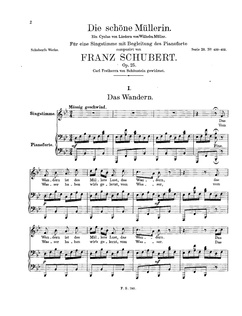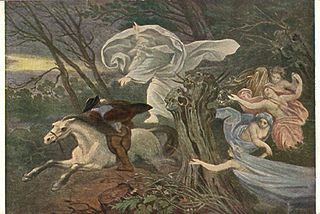Related Research Articles

Johann Carl Gottfried Loewe, usually called Carl Loewe, was a German composer, tenor singer and conductor. In his lifetime, his songs were well enough known for some to call him the "Schubert of North Germany", and Hugo Wolf came to admire his work. He is less known today, but his ballads and songs, which number over 400, are occasionally performed.
Sprechgesang and Sprechstimme are expressionist vocal techniques between singing and speaking. Though sometimes used interchangeably, Sprechgesang is directly related to the operatic recitative manner of singing, whereas Sprechstimme is closer to speech itself.
A song cycle is a group, or cycle, of individually complete songs designed to be performed in a sequence as a unit.

Strophic form – also called verse-repeating form, chorus form, AAA song form, or one-part song form – is a song structure in which all verses or stanzas of the text are sung to the same music. The opposite of strophic form, with new music written for every stanza, is called through-composed.

"Erlkönig" is a poem by Johann Wolfgang von Goethe. It depicts the death of a child assailed by a supernatural being, the Erlkönig, translated as “Elf King”, though the eponymous character is clearly some kind of demon or 'fairy king'. It was originally composed by Goethe as part of a 1782 Singspiel entitled Die Fischerin.
Elfenlied is the conventional title of a 1780 poem by Goethe, and of a later poem by Eduard Mörike.

Psalm 137 is the 137th psalm of the Book of Psalms, and as such it is included in the Hebrew Bible. In English it is generally known as "By the rivers of Babylon", which is how its first words are translated in the King James Version. It is Psalm 136 in the slightly different numbering system of the Greek Septuagint and the Latin Vulgate versions of the Bible. Its Latin title is "Super flumina Babylonis".

"Morgen!" ("Tomorrow!") is the last in a set of four songs composed in 1894 by the German composer Richard Strauss. It is designated Opus 27, Number 4.
”Rondel” is a song written by the English composer Edward Elgar in 1894 as his Op.16, No.3. The words are by Longfellow, a translation of a Rondel by Froissart. The manuscript is dated 4 January 1894.

The lied is a term in the German vernacular to describe setting poetry to classical music to create a piece of polyphonic music. The term is used for songs from the late fourteenth or early fifteenth centuries or even to refer to Minnesang from as early as the 12th and 13th centuries. It later came especially to refer to settings of Romantic poetry during the late eighteenth and nineteenth centuries, and into the early twentieth century. Examples include settings by Ludwig van Beethoven, Franz Schubert, Robert Schumann, Johannes Brahms, Hugo Wolf or Richard Strauss. Among English speakers, however, "lied" is often used interchangeably with "art song" to encompass works that the tradition has inspired in other languages. The poems that have been made into lieder often center on pastoral themes or themes of romantic love.
Four Orchestral Songs, Op. 22 is a composition by Austrian composer Arnold Schoenberg, scored for soprano and large orchestra.
Drei Lieder, for alto voice and chamber orchestra, is a song cycle by Karlheinz Stockhausen, written while he was still a conservatory student in 1950. In the composer's catalogue of works, it bears the number 1/10.
The LiederNet Archive is a donation-supported web archive of art song and choral texts founded in 1995 by Emily Ezust, an American/Canadian computer programmer and amateur violinist. The website was hosted by the REC Music Foundation from 1996 to 2015.

"Traum durch die Dämmerung", is both a German poem by Otto Julius Bierbaum and a Lied by Richard Strauss, his Op. 29/1. The opening line is "Weite Wiesen im Dämmergrau". It is the first of three songs by Strauss based on love poems by Bierbaum, composed and published in Munich in 1895, and dedicated to Eugen Gura. The works were scored for medium voice and piano, and published by Universal Edition as 3 Lieder mit Klavierbegleitung, later with English versions and orchestral arrangements.

"Ständchen", D 889, is a lied for solo voice and piano by Franz Schubert, composed in July 1826 in the then village of Währing. It is a setting of the "Song" in act 2, scene 3 of Shakespeare's Cymbeline. The song was first published by Anton Diabelli in 1830, two year's after the composer's death. The song in its original form is relatively short, and two further verses by Friedrich Reil were added to Diabelli's second edition of 1832.

"Befreit" is an art song for voice and piano composed by Richard Strauss in 1898, setting a poem by the German poet Richard Dehmel. The song is part of the collection Fünf Lieder für hohe Singstimme mit Pianofortebegleitung. Strauss orchestrated the song in 1933.

"Winternacht" is an art song for voice and piano composed by Richard Strauss in 1886, setting a poem of the same title by the German poet Adolf Friedrich von Schack (1815–1894). The song is part of his collection Five songs for middle voice and piano, Op. 15, TrV 148.

"Ständchen" ("Serenade") is an art song composed by Richard Strauss in 1886, setting a poem of the same title by the German poet Adolf Friedrich von Schack. It is the second song in his collection Six songs for high voice and piano, Op. 17, TrV 149, which were all settings of Schack poems. The song is written for voice and piano.

"Macht hoch die Tür" is a German popular Advent hymn, written in Ducal Prussia in the 17th century. The incipit is the first line, "Macht hoch die Tür, die Tor macht weit. The lyrics were written by Georg Weissel in 1623, for the inauguration of the Altroßgärter Kirche in Königsberg. The melody that is now associated with the text appeared first in 1704 in the hymnal by Johann Anastasius Freylinghausen.

"Freundliche Vision" is both a German poem by Otto Bierbaum and a Lied by Richard Strauss, his Op. 48/1. The opening line is "Nicht im Schlafe hab ich das geträumt". It is the first of five songs by Strauss, composed in 1900 and published in Berlin in 1901 by Adolph Fürstner. The works were scored for voice and piano, and arranged for voice and orchestra in 1918 by the composer.
References
- ↑ Translating poetic songs: An attempt at a functional account of strategies, Low P, Target, Volume 15, Number 1, 2003 , pp. 91-110(20), Publisher: John Benjamins Publishing Company